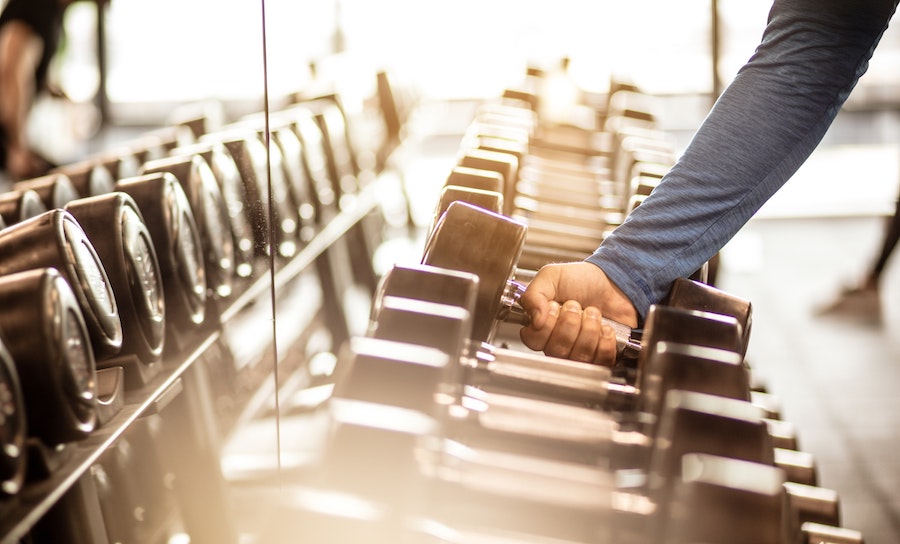Is it safe to go to the gym during the coronavirus pandemic?
An infectious disease expert reveals the answers.
If sweating through a few dozen burpees has become part of your daily routine, you’re probably wondering whether the coronavirus outbreak should affect whether you can safely continue to visit the gym.
After all, you’re paying good money for your membership, so you don’t want to miss out on the important benefits. But is it unwise to continue getting a sweat on with other members of the public on a regular basis?

Handling weights could be an issue, says Dr Pankhania
“It isn’t the working out at the gym that puts you at extra risk of catching any infection, the question is how well is the gym maintained from an infection point of view,” says Dr Bharat Pankhania, a senior clinical lecturer at the University of Exeter’s College of Medicine and Health.
Although there’s no evidence of COVID-19 spreading through sweat, he says you can catch the virus if someone with the disease coughs onto their hands and then touches the equipment.
“You could argue that gymnasiums pose an extra risk, because they have communal weights and tools that people could have touched, and that equipment might not have been sanitised properly between uses.
“The transfer of infection from your hands to your mouth, eyes or nose may then happen.
“It’s a tough balancing act, because how do you know if a place is contaminated? Well, the answer is, you don’t. In times like this, you have to think as though any place at any time (not just the gym) might be contaminated, so you behave in a way where you take precautions yourself.”
Dr Pankhania says that these precautions should include avoiding touching your face after handling any equipment and making sure that you wash your hands properly.
“People like to use alcohol hand rub – which is a good extra measure if you aren’t near a sink – but hand washing with soap and water is infinitely better.”
Recent hand-washing guidelines have circulated, suggesting that humming the ‘Happy Birthday’ song from beginning to end, twice, will ensure that you’re adequately getting the job done. However, Dr Pankhania says that we need to be more vigilant during this practice.
“When you’re washing hands, do it purposefully. Be alert to every last square centimetre of skin, including your wrists.
“When I performed surgery, I didn’t wash my hands thinking of other things. I washed my hands thinking: ‘finger one, finger two’.”
A good tip is to have your hand gel ready between exercise sets to wipe your hands and arms down, and as soon as you’re done on the gym floor, head straight to the showers and wash yourself thoroughly with antibacterial soap. Avoid touching your face and your phone while you’re mid-workout too.
“A gymnasium can be a crowded, confined space, where you might experience recirculated air rather than fresh air,” continues Pankhania. “This puts a question mark in my mind.
“Some gyms will have a good, free flow of air, whereas there are many that I have seen which almost feel like sweat rooms.
“Personally, I would feel uncomfortable going to a place that felt musty, claustrophobic and not fresh.”
And what about gym towels, could they pose a risk too? “The unused gym towels are probably cleaner than your home towels, to be honest, because they undergo an industrial wash that your own washing machine could never achieve,” assures Pankhania.
The problem is when used sweat towels aren’t cleared away from the changing rooms. “Not allowing wet towels to accumulate are good infection-control practices.
“You don’t really want to change next to a festering pile of towels that are only taken away at the end of the day.”
The bottom line is that without official advice, we all need to be prepared to use common sense judgement.
If you’re feeling unwell, have recently returned from a high-risk country or you’ve been in contact with someone who has COVID-19, it’s important to self-isolate – which means skipping the communal gym sessions to keep other visitors safe.
“For those who aren’t self-isolating, it comes down to people looking at the place they’re going to and making their own sensible assessment,” says Pankhania.
“Does your gym make you feel comfortable? Is it clean? Is it well maintained? All these things you can look at and make your own decision whether to continue to carry on visiting or not.”
He says a good gym should have proactive notices that explain the procedures they’ve put in place to help keep customers safe – such as extra wiping down of mats, communal spaces and equipment. They should also have hygiene instructions for people to follow during their visit.
“If the gym is lousy when it comes to hygiene, then don’t keep going,” says Pankhania.
“One way to force [gyms to] up their sanitary game, is to let them know that what they’re doing isn’t good enough, and that you’re not going to keep subscribing until they improve.”
The Press Association
Latest posts by The Press Association (see all)
- 5 new books to read this week - November 23, 2024
- 3 easy Mary Berry recipes to make this season - November 22, 2024
- In Pictures: Party stalwart kept New Labour in touch with traditional supporters - November 21, 2024
- 6 easy indoor exercises to try this winter – and why they are good for you - November 19, 2024
- Martin Clunes: I can’t afford to retire – I’ve got too many horses - November 19, 2024





















